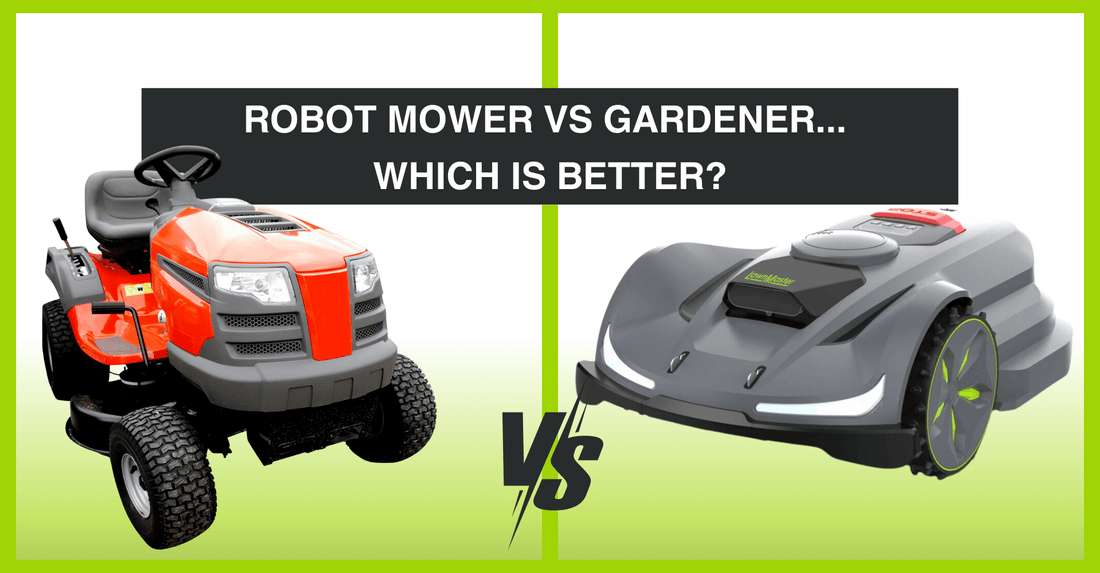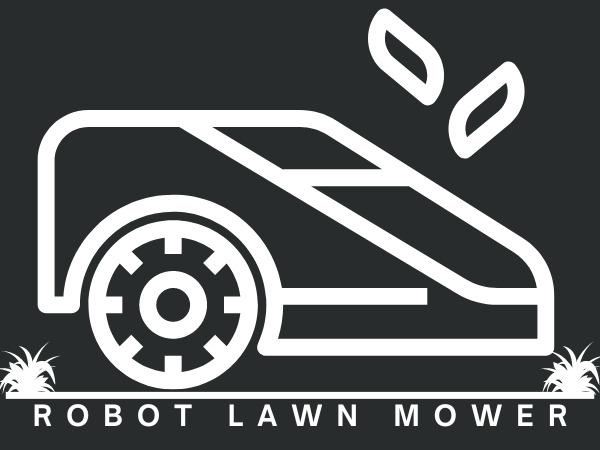
Robot Lawn Mower Vs Gardener, is a robotic mower worth it?
A gardener is someone who has been employed to maintain and care for your entire lawn and property, the tasks they perform can include but are not limited to is lawn mowing, gardening, planting shrubs and landscaping. A robotic lawn mower is a self automated machine that autonomously goes within a set perimeter and cuts the grass, keeping the lawn at a maintained height through frequent cutting. Robot lawn mowers require minimal maintenance and intervention, they are powered by rechargeable batteries and operate autonomously.
When choosing between a robot lawn mower and a gardener, it should be understood the primary difference between the two is their capability and capacity to perform the job. The job is determined by the homeowner and requirements of the property maintenance and lawn care. Knowing the requirements will help to determine whether choosing between a robot lawn mower or a gardener is the right choice for you. While it may seem like an easy decision, choosing between a robot lawn mower and a gardener is not as straightforward as it sounds.
What are the differences between a robot lawn mower and gardener?
The differences between a robot lawn mower and gardener include the cost, function and task they can both perform, ability to change the scope of work, availability, rain and eye for detail.
1. Cost
The cost differential between a robot lawn mower and gardener is an important consideration. Robot lawn mowers require a significant upfront cost compared to a gardener which requires small, but ongoing payments.
A gardener's cost is made up of their time, mileage, waste disposal and wear and tear on machines. A robot lawn mower’s costs are made up of the upfront cost of purchasing a robot mower, the replacement blades and the electricity required to operate the robot mower. The electricity to charge the mower is around $3-4 per month. Gardeners can be expensive, in summer they are required to come weekly, sometimes twice a week to keep up with the grass growth. This can quickly add up each week.
A 500m2 lawn may cost around $60 to be mowed every week in New Zealand. A robot lawn mower is going to cost around $2,000 to be suited to mowing this size lawn. To determine which is going to be more cost effective we work out the break even point. The robot lawn mower would be paid off/ break even in 33.3 weeks of using a gardener, less than a year. $2000 (cost of robot mower)/$60 (cost of gardener) = 33.3 weeks
A gardener is going to be a good option if you need one off top up maintenance or some quick tidying up of your garden and lawn. However, in the long run, a robot lawn mower is going to be significantly cheaper.
2. Function and Task:
A robot lawn mower can cut the grass and maintain your lawn at a set height. Beyond cutting the grass, a robot lawn mower can not perform other tasks that a gardener can such as cutting and pruning shrubs, weeding or performing landscaping changes. It’s important to determine your property requirements and what the job is going to entail to determine whether a robot lawn mower or gardener is going to suit your needs and be able to perform the task you require.
If you require lots of pruning and weeding, a gardener is going to be a good option; however, if your garden doesn’t require weeding or specialist tasks, a robot lawn mower is going to keep costs lower in the long run. An alternative that we have seen gain traction, is to predominantly use a robot lawn mower and get a gardener in to periodically do a top up clean or tidy up. In the long run, this will cost less than using a gardener full time.
3. Changing the scope of work:
A gardener is flexible to the scope of work being changed, you are able to determine whether you would like your hedges trimmed, weeds pulled, pesticides used and new shrubs planted. Compared to a robot lawn mower, the only function it can perform is to cut the lawn.
While a robot lawn mower does not have the flexibility to carry out other tasks such as cutting hedges or planting shrubs, a robot lawn mower does have some ability to customise the settings. Robot lawn mowers can be set up to mow zones, they can be set to mow a certain amount within each zone, operate at specific times, cut to a certain height and turn off when the weather is bad to minimise the lawn being chewed up by the wheels. It is very simple to change the settings of a robot lawn mower, this is done within the app.
4. Availability:
Robot lawn mowers are available to mow at any time, if the weather changes, you can schedule it at a later date. A gardener is subject to their timetable and availability. If the weather does not permit the maintenance work, the gardener gets sick or is on annual leave, it may be awhile before they are able to schedule your lawn back in, especially if they have a full timetable of clients. Changes are unable to be made last minute with a gardener or lawn mowing service without being charged a cancellation fee, compared to a robot lawn mower, changes can be made at any minute.
5. Rain:
Gardeners often can not operate in the rain as their equipment is heavy, if the lawn is wet, this can cause the heavy equipment to sink into the lawn and create boggy muddy sections. Gardeners are sometimes required to wait until the weather is good.
A robot lawn mower has a rain sensor delay, this will deactivate the robot lawn mower for 90 minutes (can be customised) so that the robot lawn mower is not operating when it is raining. The robot mower waits on standby, after 90 minutes it will return back out to finish the mowing job. A gardener can not do this as they have other bookings throughout the day. Robot lawn mowers are significantly lighter than traditional ride on or push mowers, this means their use isn’t going to significantly tear up the lawn. However, robot mowers operate on a continuous and frequent basis so continuous use on a wet section that doesn’t drain well can also tear up or muddy the lawn.
6. Eye for detail:
Gardeners have an eye for detail, they can apply judgement and special attention to a job. Compared to a robot lawn mower, it’s function is to cut the grass and does not apply judgement. Robot lawn mowers are sophisticated pieces of technology but they do not have an “eye for detail” they are unable to identify whether an area needs specific attention or should be avoided. To improve the cutting experience, robot lawn mowers require input from the user to change or adjust the settings.
It can take time for it to become a seamless experience using a robot lawn mower. It takes time to see how the robot mower operates on the lawn and whether adjustments to the settings need to be made.
7. Toughest conditions:
Robot lawn mowers require easy and not challenging lawns in order to do a good job. Robot lawn mowers can not navigate areas where tree roots are sticking up, rugged and extreme slopes and bumpy and uneven ground without becoming stuck and requiring to be reset.
Gardeners can work on the toughest conditions, slopes, uneven landscapes and multi sectioned properties that a robot lawn mower would find difficult to navigate.
What are the overall pros and cons when comparing robot lawn mowers and gardeners?
The decisions regarding the pros and cons of robot lawn mower are highly situational, with both the gardener and robot lawn mower having their benefits and drawbacks.
Robot lawn mowers require a large investment up front, this is to purchase the mower and then the time at the beginning to set it up and make adjustments based on how it has been operating.
Gardeners do not require a significant investment upfront, they require smaller ongoing payments, which can be easier to manage.
What are the advantages of robot lawn mowers when compared to gardeners?
The advantages of robot lawn mowers when compared to gardeners include the following
- One upfront cost required
- Maintains lawn at a consistent height year round
- Minimal input is required
- Cheaper than a gardener in the long run
What are the advantages of gardeners when compared to robot lawn mowers?
The advantages of gardeners when compared to robot lawn mowers include the following:
- Works to difficult conditions
- No large upfront cost, made up of smaller ongoing costs
- Attention to detail
- Weeding, planting and shrubbery work
Are robotic lawn mowers worth buying?
Yes, they are worth buying. Robot lawn mowers cost significantly less than gardeners and require less maintenance than owning a traditional petrol mower. A robot lawn mower does not need oil replacements, spark plugs, wheel changes or gas to operate. If you’re deciding between a robot mower and a landscaping service, it’s a huge savings opportunity.
What is the disadvantage of robotic lawn mowers?
One of the disadvantages of robotic lawn mowers is their upfront cost, they can be a significant investment. However, in the long run, robot lawn mowers are significantly cheaper than the cost of a gardener.
Do robot mowers cut wet grass?
Robot lawn mowers can cut slightly wet grass. Robot lawn mowers are significantly lighter than traditional mowers so they are less likely to tear up the grass after it has been raining. However, the conditions can not be bogged down or else it may cause damage in those extremely wet areas.
Where does the grass go with a robot mower?
The robotic mower cuts the grass into small pieces through regular cutting, these small cuttings are able to decompose in the lawn within a short time. This supplies the lawn with a fertiliser, gardeners on the other hand must collect the clippings or they will turn soggy, slippery and not decompose into the lawn, this can also block the sunlight and cause a patchy lawn.
